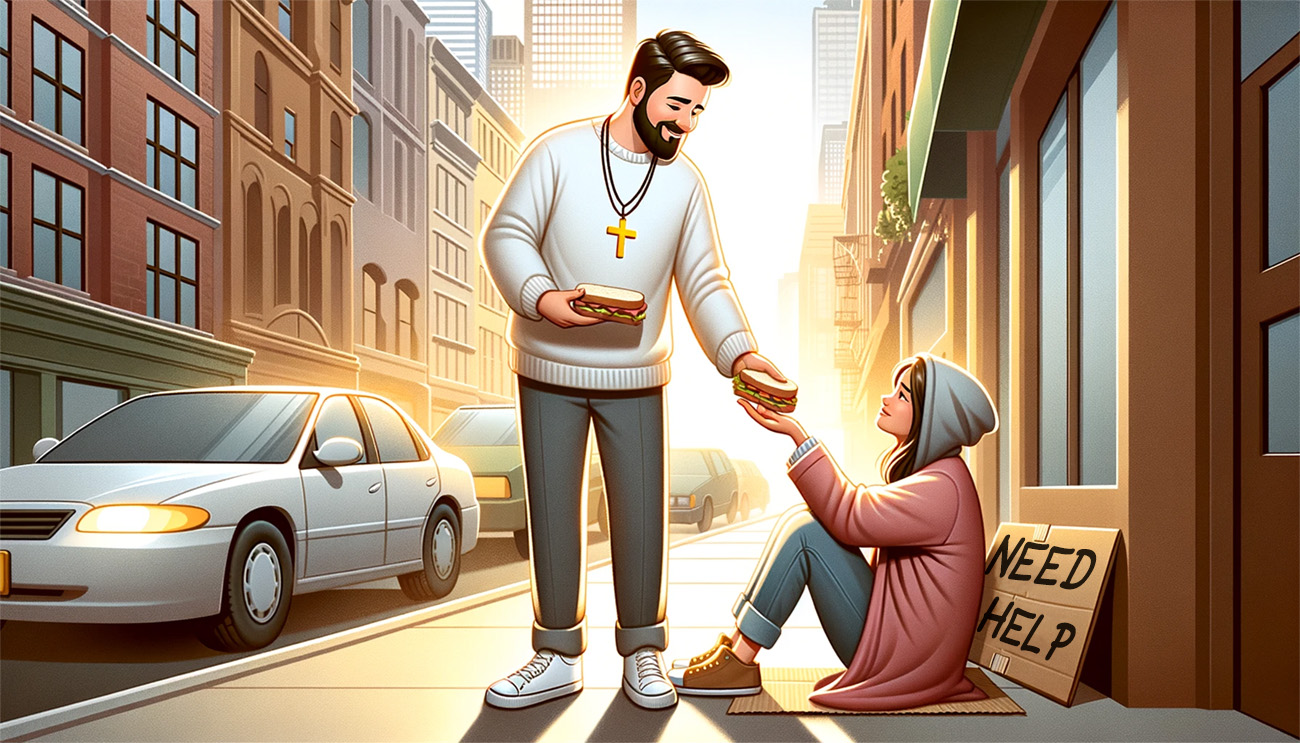In the last post, we talked about “The Amoral Principle.” In it, we discussed that if someone personally believes that a specific action is evil, it becomes a sin for that person to do it. Today we will be looking at a contrasting idea taught in Scripture which I like to call “The Law of Opportunity and Action” which teaches that if someone thinks something is good to do but chooses not to do it, it becomes sin for them not to do it. We see this statement taught in James 4:17, where it says,
Therefore to him that knoweth to do good, and doeth it not, to him it is sin.
James 4:17
Most of us who have studied James realize that the main theme of James’ letter is living out our faith. This is also the main idea of what we’ll be talking about in our post today. In Chapter 4, James starts out by asking the scattered believers a rhetorical question: “Where do the disputes in our churches come from?” Of course, the answer is our sinful human desires.
Ye lust, and have not: ye kill, and desire to have, and cannot obtain: ye fight and war, yet ye have not, because ye ask not. Ye ask, and receive not, because ye ask amiss, that ye may consume it upon your lusts.
James 4:2-3
James isn’t holding back here, he lays down the facts. The problem with the church is that they are selfish and desire to please themselves even if it is at other people’s expense. He then reminds them of a common theme in scripture.
Do ye think that the scripture saith in vain, The spirit that dwelleth in us lusteth to envy?
James 4:5
Our inner-self desires and envies all sorts of things. It wants what it lusts for regardless of the harm of its selfish pursuit. In the next few verses, James shifts gears and proceeds to list a bunch of things that we as Christians know we should do. Verse 7 says to submit to God and run from the devil. Verse 8 says to draw near to God, to cleanse sin from lives and our hearts and be singularly focused on God. Verse 9 says to be brought low so that in verse 10 we can be humbled by God and be lifted up by Him. Verse 11 says that we should not speak badly about others or judge people incorrectly. And lastly, in verses 13-16, James says we should not brag about our plans or successes in life because it is evil to do so. It is at this point that James introduces us to the Law of Opportunity and Action and we see our main verse.
Therefore to him that knoweth to do good, and doeth it not, to him it is sin.
James 4:17
James is saying, “You all know what is right to do, but you are not doing it. You don’t move to action to do what is good because you are selfish and do not wish to share what is yours. It’s a sin to disobey in this way.” What is interesting is that James isn’t focusing on what we shouldn’t do. Often times in church we will overemphasize to not do this or that to the point we neglect to emphasize the other side, that is, that there are good things that we should be doing as well.
So what James is trying to show us is that if we know that we have an opportunity to do something that is good and right, we are obligated to do it. As he says previously in the first chapter we should be “doers of the word, and not hearers only.” John also emphasizes this in 1 John 3:17
But whoso hath this world’s good, and seeth his brother have need, and shutteth up his bowels of compassion from him, how dwelleth the love of God in him? My little children, let us not love in word, neither in tongue; but in deed and in truth.
1 John 3:17
In this scenario, the believer sees a person who lacks some of life’s necessities. We are not told specifically what, but it could be food, water, clothing, or safe lodging. Regardless of what it is, John tells us that refusing to act on seeing these needs is to reject the love of God in one’s life. We can’t live like Christians if we refuse to help those in need. We constantly see Christ’s compassionate love for others moving Him to perform miracles throughout the gospels and we know from John 13:29 that it was not uncommon for Him to give money to the poor. So If John and James’ teaching wasn’t enough to convince you, let’s take a look at what Jesus has to say on the matter in Matthew 25.
When the Son of man shall come in his glory … Then shall the King say unto them on his right hand, Come, ye blessed of my Father, inherit the kingdom prepared for you from the foundation of the world: For I was an hungred, and ye gave me meat: I was thirsty, and ye gave me drink: I was a stranger, and ye took me in: Naked, and ye clothed me: I was sick, and ye visited me: I was in prison, and ye came unto me. Then shall the righteous answer him, saying, Lord, when saw we thee an hungred, and fed thee? or thirsty, and gave thee drink? … And the King shall answer and say unto them, Verily I say unto you, Inasmuch as ye have done it unto one of the least of these my brethren, ye have done it unto me.” <
Matthew 25:31,34-38, 40
Here Jesus lays out an even more complete illustration in which He tells us that He considers any action done toward others as an action done towards Him. If we care for, provide for, and love others then we in turn also care for, provide for, and love Him. On the other hand, if we belittle, despise, or ignore the needs of others, we also belittle, despise, and ignore our Lord and Master, Jesus Christ. Our actions toward others are no joke to Jesus, so they should be of utmost importance to us. <
This illustration gives us a pretty extensive list of things we ought to do- feed the hungry, give drink to the thirsty, give shelter to the homeless, clothe the naked, visit the sick and imprisoned. But there are even more things we need to do, James also adds “the fatherless and widows” to the visiting list. (It is important to note that the word “visit” in both James and Matthew means “to look after/care for” in the original languages.) Paul adds in 1 Timothy 5:17 to not only care for widows but to also be sure to provide good pay to the pastors (Elders) who lead well. Lastly, I think Proverbs 3:27 summarizes the theme of today’s lesson pretty well.
Withhold not good from them to whom it is due, when it is in the power of thine hand to do it.
Proverbs 3:27
So what is the sum of what Scripture is saying? What is our responsibility as Christians? Well, our responsibility is this: When we see a need, whether financial or otherwise, we should consider the cost and see if we have the ability to help. We must ask ourselves, “Do I have the time, money, or opportunity to help with this need? Is there anything that is truly preventing me from being able to do this?” If the answer is “No, I honestly don’t have the time or money,” then we are not obligated to help because we lack the resources to do so, but if the answer is “Yes, I have the time or money, or have the ability to restructure my plans or budget to accommodate fulfilling this need.” Then we are obligated before God to move to action. If we are able to do it and refuse, then as James teaches it becomes a sin to us. When we see an opportunity we are compelled to act. Ephesians 2:10 says we are “created in Christ Jesus unto good works, which God hath before ordained that we should walk in them”
So when we see a true need and have the ability to act, we know at that moment that God has prepared us in advance to do it on His behalf. If we are to make a real difference as Christians in this life, we have to make the Law of Opportunity and Action a part of our daily walk, we must keep our eyes open so that we do not miss an opportunity that God has given us to show the love of Christ not only through our words but also through our actions. It is only when we do this that we can make a difference in other people’s lives and draw them to Christ’s love. So let us set out today to make our lives not be known by empty talk, but rather filled with a fruitful walk.



